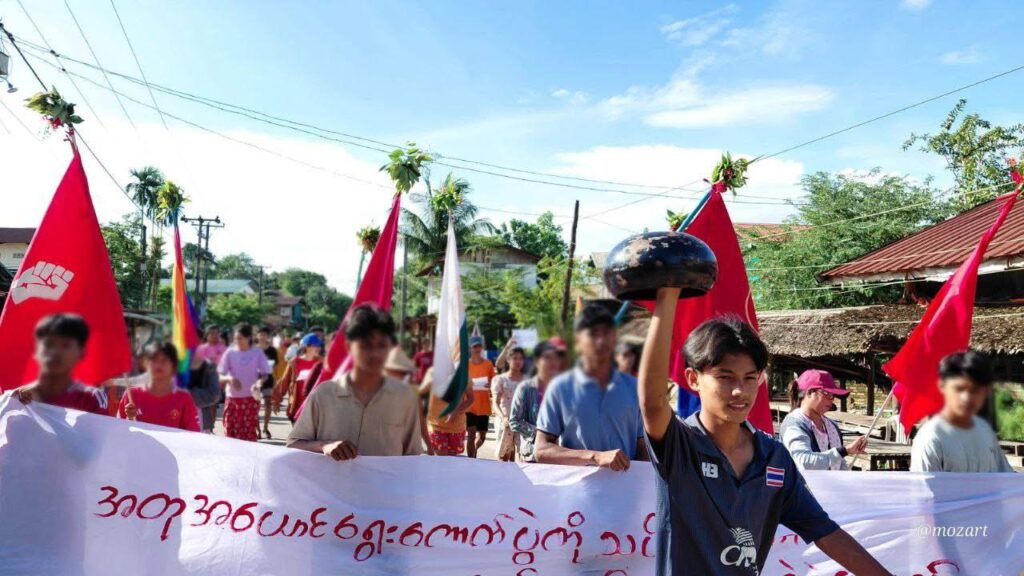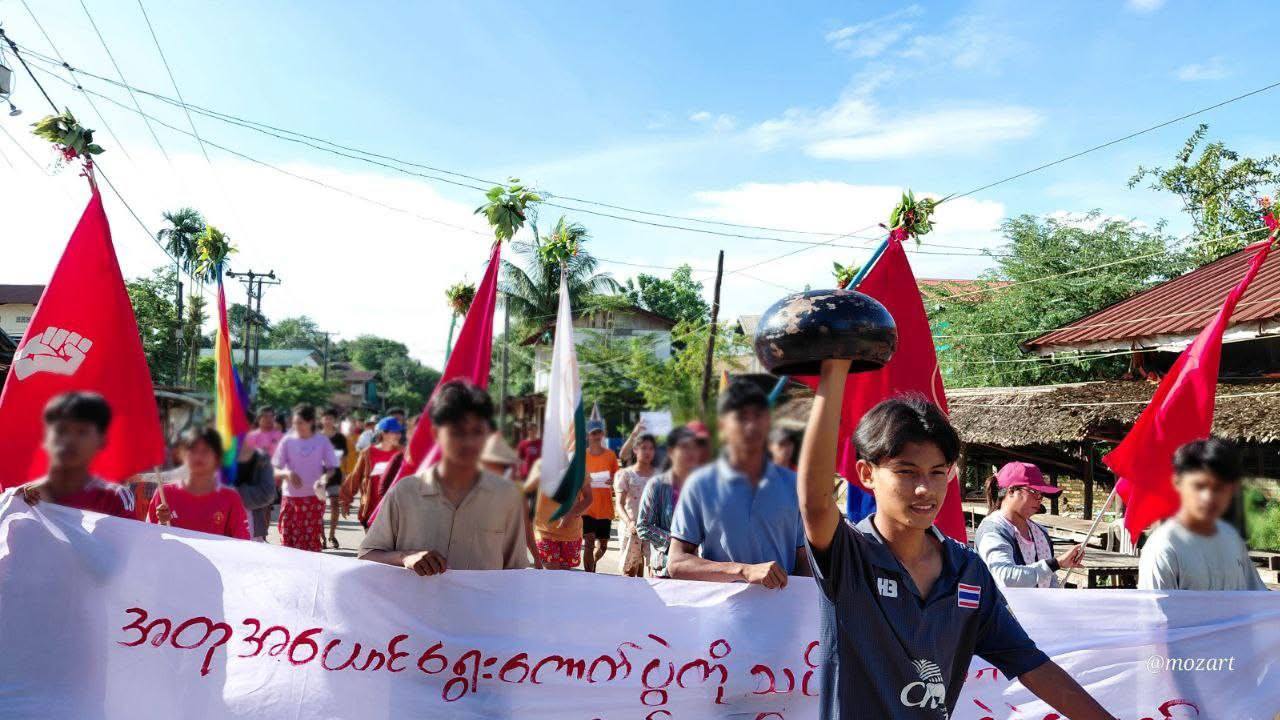
Since the 2021 military coup that overthrew democracy in Myanmar, various forms of resistance have emerged against the military dictatorship. These efforts, grouped together as the Spring Revolution, have included both non-violent and armed struggles. The non-violent resistance has been widespread, involving a Civil Disobedience Movement. This movement saw workers from various sectors, including civil servants and students, participate in general strikes, quit their jobs, or boycott schools to disrupt the junta’s administration. Additionally, these groups have actively raised funds to support the armed resistance. The armed struggle is a coalition of forces with a shared goal of establishing a federal democratic state. This includes a number of Ethnic Armed Organizations, People’s Defence Forces—many of which operate under the National Unity Government (NUG)—and various independent Local Defence Forces.
Operation 1027: The Hope of Revolution
The Myanmar military’s control has been significantly diminished, with its forces largely confined to central and urban areas, thanks primarily to the Three Brotherhood Alliance (comprised of the Arakan Army, the Myanmar National Democratic Alliance Army, and the Ta’ang National Liberation Army), which launched Operation 1027 in October 2023. The alliance, which has long-standing ties to China, conducted the offensive with Beijing’s implicit consent. The initial objective was to punish the junta for its role in cyber scams.
The first phase of the operation resulted in the alliance seizing large parts of the Rakhine and northern Shan states, which fuelled optimism for the revolutionary forces. The second phase of Operation 1027 began in June 2024, despite attempts by China to impose a ceasefire. During this new offensive, the military was unable to halt the resistance’s advances, even with multiple counteroffensives and widespread bombings.
The Myanmar Junta and the Role of Russian Imperialism
While fighting a civil war, the Myanmar military junta has prioritised strengthening its diplomatic relationship with Russia. In November 2023, the coup leader, Senior General Min Aung Hlaing, met with Russia’s naval chief ahead of the two nations’ first joint maritime exercises in the Andaman Sea.
As the military faced significant setbacks because of the Three Brotherhood Alliance, its political proxy party, the Union Solidarity and Development Party, publicly requested Russia’s help to combat ethnic armed and resistance forces in August 2024. During that same month, a junta delegation attended Russia’s 9th Eastern Economic Forum, where they announced Myanmar’s long-term aspiration to join the Russian, Chinese, and Indian-led BRICS group, starting with an application for observer status. Further cooperation was demonstrated in October 2024 when Russia’s Pacific Fleet participated in a second joint naval exercise with Myanmar.
Russia, globally isolated since its full-scale invasion of Ukraine in 2022, has become a key arms supplier to the equally isolated Myanmar regime.
The Myanmar Junta and the Role of Chinese Imperialism
While China initially saw benefits from the first phase of Operation 1027, which targeted cyber scam operations, the subsequent phase went far beyond Beijing’s expectations. The Three Brotherhood Alliance, coordinating closely with the pro-democracy NUG and People’s Defence Forces, captured key cities and threatened Mandalay, Myanmar’s second-largest city. China grew increasingly concerned that its proxies—including the Three Brotherhood Alliance, United Wa State Army, and Kachin Independence Army—were becoming too close to NUG and ‘Western imperialism’. This presented an intolerable risk to China’s regional hegemony.
In response, Chinese Foreign Minister Wang Yi travelled to Naypyidaw on 14 August 2024 to meet directly with Min Aung Hlaing. During the meeting, Wang Yi emphasised that Myanmar needed to advance a ‘new Five-Point Road Map’ within a ‘constitutional framework’ to achieve political reconciliation and a democratic transition. Although this language seemed pro-democracy, the ‘constitutional framework’ actually referred to Myanmar’s 2008 constitution—the status quo which the pro-democracy resistance has openly rejected.
Beijing’s Rage against the Three Brotherhood Alliance
After becoming paranoid about its proxies getting closer to the NUG and ‘Western imperialism’, China took a more assertive pro-junta stance. It closed border crossings and cut off vital supplies like food and electricity to areas controlled by the Ethnic Armed Organizations, a move that impacted both their military campaigns and local economies. To further signal its displeasure and send a clear warning, China also conducted live-fire military drills.
Believing the Three Brotherhood Alliance was receiving support from the powerful United Wa State Army, China reportedly threatened the latter that it would cut off its support, including the flow of weapons. In August 2024, Beijing reportedly issued a threatening letter to the Ta’ang National Liberation Army. Additionally, in a move widely seen as an attempt to coerce the group into a complete withdrawal from Lashio, China allegedly detained the Myanmar National Democratic Alliance’s commander, Peng Daxun, after inviting him for talks in October 2024. China also proposed to the junta the establishment of a security company to protect its assets and Belt and Road Initiative projects in Myanmar. These actions collectively indicate that China has abandoned its ‘double game’ in Myanmar for a more direct and openly pro-junta policy.
The Role of US Imperialism
In August 2025, Myanmar’s military junta hired the Washington-based lobbying firm DCI Group to improve relations with the United States, particularly concerning trade, natural resources, and humanitarian aid. The agreement stipulates an annual payment of $3 million to the firm. This development follows the Trump administration’s decision in August 2025 to lift sanctions on certain allies of Myanmar’s generals and their military-linked companies.
Reports also indicate that the Trump administration is seeking to gain access to Myanmar’s rare earth minerals to compete with China. There are reportedly two proposals being considered: one involves engaging in talks with the junta, while the other suggests direct negotiations with the political wing of the Kachin Independence Army.
The Goal of a Sham Election
Since its diplomatic isolation following the 2021 coup, the Myanmar military junta has recently achieved a notable shift in its international standing due to an invitation from China in November 2024 for the military leader Min Aung Hlaing to attend the Mekong-Lancang Summit, which led to his first direct engagement with regional leaders, including those from Thailand. This was followed by a series of high-level visits to Thailand, Belarus, and Russia, where he met with figures such as President Vladimir Putin. In addition, China invited the junta’s proxy Union Solidarity and Development Party (and its controlled opposition parties) for a seven-day visit to China in July 2024.
In August 2025, the junta declared that an election was to be held around December 2025. This initiative was intended to secure support from ASEAN and the broader international community to recognise the military’s proxy government. At the Mekong-Lancang Cooperation Foreign Ministers’ Meeting in August 2025, Chinese Foreign Minister Wang Yi reportedly endorsed the junta’s election proposal. Others, including Russia and India, have also voiced their support. China is not only offering verbal support but is also actively assisting the junta with its election preparations, a move the military junta views as a crucial step toward achieving diplomatic legitimacy.
Furthermore, Min Aung Hlaing’s attendance at the 80th anniversary of the Soviet Union’s Victory in the Great Patriotic War in Moscow in May 2025, where he was received by Chinese President Xi Jinping, highlighted the junta’s growing international acceptance. Myanmar’s military also participated in the celebratory parade for the first time. The support for the junta’s election plan from countries that are either founding members or partners of the BRICS group—including China, India, Thailand, Russia, Belarus, and Cambodia—is a significant development. It suggests that the military regime could be considered for BRICS observer status or membership, which could effectively shield them from Western sanctions. Here, it is worth noting that Myanmar was formally admitted as a ‘dialogue partner’ of the Shanghai Cooperation Organisation (SCO) on 5 May 2023. As a regional bloc led by China, Russia, Iran, and India, the SCO focuses on security, counterterrorism, and economic cooperation across Eurasia, which may serve to insulate the junta from the impact of Western sanctions.
The election scheduled for late 2025 in Myanmar is widely viewed as a fraudulent spectacle rather than a genuine democratic exercise by the population inside Myanmar and the resistance groups. This perspective is rooted in the ongoing civil war, which has severely limited the junta’s territorial control. The military’s relentless escalation of attacks on civilians, including bombings and ground assaults, makes a free and fair election impossible. A fundamental concern is the absence of a legitimate opposition. The election is expected to feature only the military’s political party and groups it controls. The junta’s claim to have invited opponents to participate is widely dismissed as a hollow gesture, given that the regime has imprisoned or executed numerous political opponents and activists.
It is important to recognise that Myanmar’s military regime has strategically aligned itself with governments from BRICS and SCO member states, leveraging its planned election to gain diplomatic legitimacy in defiance of Western influence. The more pressing question, however, is whether the National Unity Government, representing the resistance, possesses the strategic acumen to effectively counter this evolving diplomatic offensive, which currently appears to favour the junta. How the resistance deals with the election and the growing international prestige of the junta will decide the future of Myanmar.
Related reading
The roots of political Buddhism in Burma, by Hein Htet Kyaw
Political Buddhism, bhikkhuni, and gender apartheid in Burma, by Hein Htet Kyaw









Your email address will not be published. Comments are subject to our Community Guidelines. Required fields are marked *
Donate